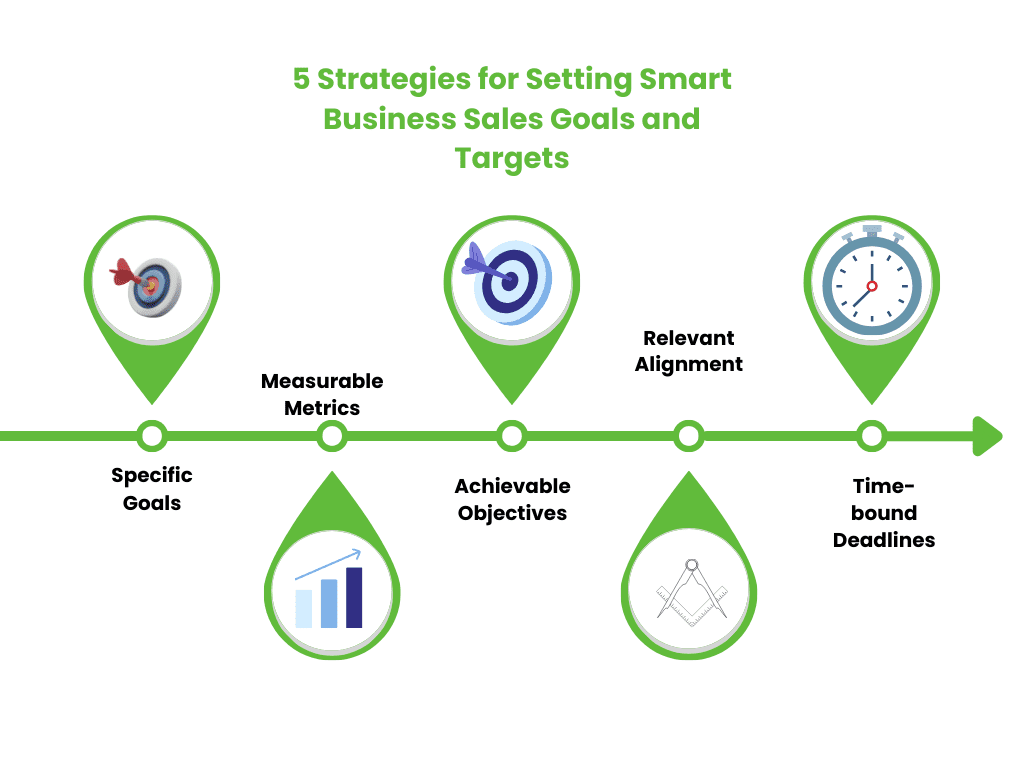Reading time 5 minutes
Did you know businesses with clear sales goals are 20% more likely to succeed? In this blog, we’ll explore five strategies to help you set smart sales goals and targets for your business. Setting these goals isn’t just a good idea; it’s essential for your business’s growth and success.
SMART business sales means setting clear, measurable, achievable, relevant, and time-bound sales goals. It helps companies define objectives clearly, track progress easily, ensure goals are realistic, align sales targets with broader business goals, and set deadlines for accomplishment. This approach allows businesses to plan effectively, monitor their sales performance, and increase the likelihood of success.
Turning a small business into a SMART business leads to setting clear goals that are achievable and relevant. Business Sales work by setting clear goals, like increasing sales or launching new products, and using measurable metrics to track progress. Goals are achievable and fit with the company’s overall objectives. Deadlines are set to keep things moving, and the team regularly checks how they’re doing and adjusts as needed. By staying flexible and focused, businesses can grow and succeed.
Importance of Setting Effective Sales Goals
Direction: Sales goals provide a clear roadmap for the sales team, guiding their efforts toward specific objectives.
Motivation: Defined goals give salespeople something tangible to strive for, boosting their morale and driving performance.
Progress Tracking: Goals allow businesses to monitor sales performance, identify areas of improvement, and measure success.
Focus: Having clear goals helps teams prioritize tasks and allocate resources effectively, maximizing productivity.
Accountability: Setting goals holds individuals and teams accountable for their performance, encouraging ownership and responsibility.
Team Collaboration: Shared sales goals foster collaboration and teamwork, as everyone works towards a common objective.
Alignment: Sales goals ensure that the sales strategy is aligned with broader business objectives, driving overall success.
Growth and Success: Achieving sales goals helps to grow your business, increasing revenue, and long-term success.
Why setting these goals is crucial for business success and growth.
Setting goals is important for business success and growth because they give direction, keep everyone motivated, and help track progress. Goals also make everyone’s working towards the same objectives and can adapt to changes in the market. By staying focused on these goals, businesses can overcome challenges and achieve in the long run.
Data is crucial for business success and growth because it helps make smart decisions and plan for the future. By understanding what customers like and how the market is changing, companies can offer better products and stay ahead of the competition. Analyzing data also helps in improving how businesses run, making them more efficient and effective. By, keeping track of how well things are going, companies can spot areas for improvement and make changes as needed. Overall, using data helps businesses stay competitive, adapt to changes, and keep growing.
According to Salesforce data, 66% of sales employees handle administrative tasks. Using SMART sales goals can improve your strategy and business efforts, and track progress effectively.
5 Proven Approaches to Setting Smart Business Sales Goals and Targets

1. Specific Goals:
“Specific goals” are like road signs that tell you exactly where to go. They’re clear and detailed, answering the questions below-
What do we want to achieve?
How will we know when we get there?
What resources are required to achieve the goal?
When you respond to these inquiries, you gain an understanding of a goal’s alignment with your business. Additionally, it guides resource distribution, and team structuring, and sets precise parameters for goal achievement.
B2B businesses that set specific sales goals are 50% more likely to achieve their targets compared to those with vague or undefined goals. This emphasizes the importance of specificity in driving sales success.
2. Measurable Metrics:
“Measurable metrics” are numbers that show how well you’re doing. For example, in sales, this could be how much money you make each month or how many products you sell. These numbers help you see if you’re reaching your goals and where you need to question yourself like-
How many customers did we gain this month?
What was our total sales revenue last quarter?
How many new leads did we generate from our marketing campaign?
Setting this helps businesses see if they’re doing well and where they can be best. Using measurable metrics lets businesses track progress, make changes when needed, and improve their chances of reaching their goals.
3. Achievable Objectives:
“Achievable objectives” are goals that you can realistically reach with the resources and time. They’re not too easy, but they’re also not impossible. For example, if you set a sales target that matches what your team can realistically sell, it’s an achievable objective.
Since you are aware that these objectives are achievable they help you stay motivated and focused. As a result, they help to avoid annoyance and reduce signs of pressure. Setting achievable objectives sets you up for success by giving you a clear path to follow and goals that you can achieve.
Businesses that set challenging but attainable sales goals outperform their competitors by an average of 20%. This shows the significance of balancing achievability with ambition when setting sales goals.
4. Relevant Alignment:
“Relevant alignment” is making sure your goals fit with what your business wants to achieve. For example, if your organization wants to make customers happy, your sales goals and marketing platforms should focus on giving great customer service. This way, your sales efforts support the bigger goals of your business. It’s about staying focused on what matters making sure everything you do moves business in the right direction.
Companies that set relevant sales goals based on market trends and customer demands experience a 15% higher sales growth rate compared to those that do not. This shows the importance of adapting sales goals to match the ever-changing business environment.
5. Time-bound Deadlines:
To bring everything together, the last step is to give your goals a deadline- Time-bound deadlines are specific times set for reaching goals. They make sure things get done on time and help teams stay focused. For instance, If your objective is to boost sales by the end of the month, that deadline has a time limit.
It gives everyone a clear target to aim for and keeps things moving forward. Having deadlines also helps track progress and makes everyone responsible for their work. Setting time-bound deadlines keeps projects organized and increases the chances of reaching goals on time.
Conclusion
In conclusion, these 5 strategies for setting smart business sales goals and targets are vital for success. They help businesses set clear achievable goals using the SMART framework and market analysis.
Our reliable and up-to-date B2B Email List helps you find prospective organizations ready to buy. We verify every contact through multiple checks and keep the information current. This ensures accuracy, so your emails reach their intended targets.
Are you facing any difficulties? We are here to clear your doubts, You can reach out to our database at FountMedia a great way to reach more people and support your growth and campaign success. Contact our customer support executive at +1-732-703-9915, Get a free sample!



